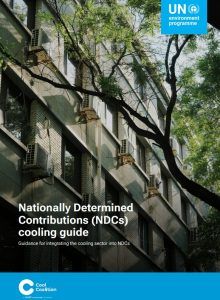june, 2025
23jun10:3011:45Adapting to Rising Temperatures: Mainstreaming Sustainable Cooling in NDCs
Event Details
Background Extreme heat is emerging as the defining climate risk of
Event Details
 Background
Background
Extreme heat is emerging as the defining climate risk of this decade. The 2023 Global Cooling Watch warns that without decisive action, cooling-sector emissions could reach 6.1 gigatonnes of CO₂ equivalent by 2050, which is more than 10 per cent of projected global emissions. Meanwhile, over one billion people still lack access to adequate cooling, which puts lives, food, medicines and economic productivity in jeopardy.
Sustainable cooling, which combines efficient equipment, climate-friendly refrigerants, and demand-reduction strategies, is therefore a frontline adaptation priority. To accelerate progress, the United Nations Environment Programme (UNEP)-convened Cool Coalition unites over 250 governments, cities, companies, and financiers, advancing a triple strategy of passive design, energy efficiency, and HFC phase-down. At the 2023 UN Climate Change Conference (COP28), the Cool Coalition launched the Global Cooling Pledge, the world’s first collective commitment to cut cooling-related emissions by 60 per cent by 2050, while expanding equitable access by 2030.
As countries prepare their third-round Nationally Determined Contributions (NDC 3.0), integrating cooling is critical for meeting targets, including those delivered under the Global Goal on Adaptation (GGA), the Paris Agreement’s collective target to enhance adaptive capacity, strengthen resilience and reduce vulnerability. To guide this process, the Cool Coalition NDC Working Group, with contributions from the American University in Cairo, the Climate and Clean Air Coalition (CCAC), Clean Cooling Collaborative (CCC), Collaborative Labeling and Appliance Standards Program (CLASP), Deutsche Gesellschaft für Internationale Zusammenarbeit (GIZ) Proklima, the Ozone Secretariat, Sustainable Energy for All (SEforALL), United Nations Development Programme (UNDP), UNEP Copenhagen Climate Centre (UNEP-CCC), and UNEP United for Efficiency (U4E), have developed the NDC Cooling Guide, a practical roadmap for embedding sustainable cooling into climate strategies and ensuring real-world results.
This side event, convened by the UNEP Cool Coalition, brings together government representatives and sustainable development experts to officially launch the NDC Cooling Guide, and foster high-level dialogue on how sustainable cooling can be embedded in national adaptation strategies.
Objectives
- Position sustainable cooling as an essential, integrated pillar of adaptation within NDCs 3.0, National Cooling Action Plans, urban heat-action plans, and the Global Goal on Adaptation, emphasising co-benefits for public health, food security, and economic resilience.
- Formally launch the NDC Cooling Guide and delineate their principal recommendations for policymakers, technical experts, development partners, private-sector executives, and financial institutions.
- Exhibit exemplary national leadership and best practice, illustrating how governments are deploying passive design, high-efficiency technologies, and low-GWP refrigerants to address rising extreme heat and advance climate objectives.
- Highlight the Global Cooling Pledge role in guiding countries toward sustainable cooling solutions through policy, technology, and capacity-building.
- Announce forthcoming capacity-building programmes and implementation support mechanisms designed to translate the Guidelines into measurable, on-the-ground results, particularly for Global Cooling Pledge Signatories.
- Facilitate high-level dialogue and cross-sector collaboration among governments, international organisations, financial institutions, and technical partners, with a view to mobilising resources and scaling equitable, climate-aligned cooling solutions globally.
Agenda
10:30 – 10:35 (5 mins)
Welcome Remarks
Delivered by Ms Sophie Loran, Global Lead for Advocacy & Communications at the Climate Action Branch, UNEP.
10:35 – 10:45 (10 mins)
Opening Keynote: The Global Heat Challenge
Presented by Ms Amanda McKee, Director for Knowledge and Learning at the NDC Partnership.
10:45 – 10:55 (10 mins)
Presentation: Launch of the NDC Cooling Guide
Led by Mr Amr Seleem, Country Engagement and Climate Policy Lead at the UNEP Cool Coalition.
10:55 – 11:00 (5 mins)
Video Screening: Cooler NDCs, Safer Futures
11:00 – 11:40 (40 mins)
High-Level Panel: Leadership on Cooling, Adaptation, and NDC Integration
Panelists include:
-
Dr Ziaul Haque, Director, Department of Environment, Bangladesh Ministry of Environment, Forest and Climate Change
-
Mr Abdullahi Khalif, Somalia Climate Change Analyst for NDCs and Climate Finance Lead
-
Mr Dietram Oppelt, Managing Director, HEAT
-
Mr Leang Sophal, Deputy Director, Department of Climate Change, Cambodia Ministry of Environment
-
Mr Hubert Nsoh Zan, Assistant Manager, Ghana Energy Commission
Moderated by Mr Amr Seleem, Country Engagement and Climate Policy Lead, UNEP Cool Coalition.
11:40 – 11:45 (5 mins)
Closing Remarks
Concluding remarks by Ms Sophie Loran, Global Lead for Advocacy & Communications, Climate Action Branch, UNEP.
Resources
Time
(Monday) 10:30 - 11:45
